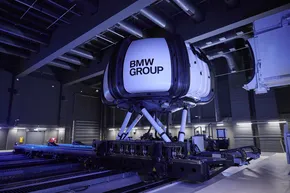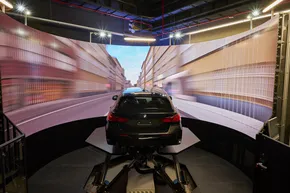Driving simulators are increasingly used for research, development, and testing in fields such as autonomous driving, human driving behavior, new UI/UX concepts, and driving dynamics. The simulators offer a safer and measurable testing environment, with further advantages in their controllability and reproducibility. Essentially, the road is brought into the lab, allowing for shorter development cycles of new vehicles and accelerated research on drivers and vehicles. In addition to car manufacturers, driving simulators are also utilized by universities, research institutions, and traffic authorities.
For results found in driving simulator studies to be valid and therefore capable of replacing real-world vehicle tests, the simulators must provide the impression of a real drive. To achieve this, visual, vestibular, acoustic, and haptic stimuli are generated. The motion of the driving simulator generates forces that act on the driver's body within the simulator. These motion stimuli are referred to as "Motion Cues". Algorithms that calculate the control signals for the motion system of the simulator are called "Motion Cueing Algorithms" (MCAs).
MCAs must create a highly realistic motion experience from the perspective of the test subject (driver) while being limited to the motion space of the simulator, which is orders of magnitude smaller than the driving maneuvers on real roads. If perceived accelerations and angular velocities in the simulator deviate too much from those that would be experienced in a real vehicle, it reduces realism and can lead to motion sickness.
As part of my research, I am investigating Model Predictive Control (MPC)-based Motion Cueing Algorithms, which show great potential for controlling large and complex driving simulators. Challenges lie in formulating and efficiently solving optimization problems in real time for nonlinear simulator systems with up to nine non-independent degrees of freedom. The presence of the human driver in the system introduces two additional challenges. Firstly, we must predict driver inputs in the simulator over a long enough time horizon to calculate the optimal motion of the simulator, i.e., the motion that the driver expects based on their inputs. Secondly, it is an open question of how we can directly optimize for the test subjects' subjective rating metrics, i.e., how to design MCAs that directly optimize for the best rating according to the unknown subjective human driver in the system. Therefore, machine learning and learning-based control approaches also play a role in my work alongside MPC.


